
The Goethe-Institut is a non-profit German cultural association operational worldwide with 159 institutes, promoting the study of the German language abroad and encouraging international cultural exchange and relations. Around 246,000 people take part in these German courses per year.

Ernst Alfred Cassirer was a German philosopher. Trained within the Neo-Kantian Marburg School, he initially followed his mentor Hermann Cohen in attempting to supply an idealistic philosophy of science.
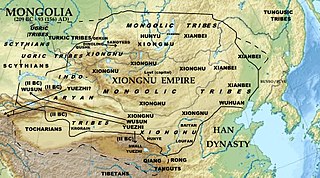
Chanyu or Shanyu, short for Chengli Gutu Chanyu, was the title used by the supreme rulers of Inner Asian nomads for eight centuries until superseded by the title "Khagan" in 402 CE. The title was most famously used by the ruling Luandi clan of the Xiongnu during the Qin dynasty and Han dynasty. It was later also used infrequently by the Chinese as a reference to Tujue leaders.

Classic Chinese Novels are the best-known novels of pre-modern Chinese literature. These are among the world's longest and oldest novels. They represented a new complexity in structure and sophistication in language that helped to establish the novel as a respected form among later popular audiences and sophisticated critics.

Molefi Kete Asante is an American professor and philosopher. He is a leading figure in the fields of African-American studies, African studies, and communication studies. He is currently a professor in the Department of Africology at Temple University, where he founded the PhD program in African-American Studies. He is president of the Molefi Kete Asante Institute for Afrocentric Studies.

Weimar Classicism was a German literary and cultural movement, whose practitioners established a new humanism from the synthesis of ideas from Romanticism, Classicism, and the Age of Enlightenment. It was named after the city of Weimar, Germany, because the leading authors of Weimar Classicism lived there.

The Berlin-Brandenburg Academy of Sciences and Humanities, abbreviated BBAW, is the official academic society for the natural sciences and humanities for the German states of Berlin and Brandenburg. Housed in three locations in and around Berlin, Germany, the BBAW is the largest non-university humanities research institute in the region.

Jana S. Rošker is a Slovenian sinologist and professor at the Department of Asian Studies at the Faculty of Arts of the University of Ljubljana.
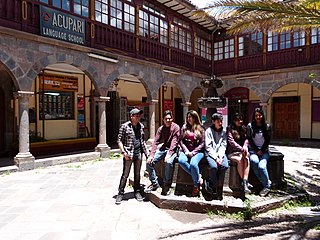
The Cultural Association ACUPARI is the responsible body of the same named language school for German, Spanish and Quechua in Cusco, Peru. The aim of this German Peruvian Cultural Association is to develop the intercultural dialogue between these two countries. For this reason ACUPARI partners with the Goethe-Institut and is a certified member of the network for language schools TANDEM International.

Music archaeology is an interdisciplinary field of study that combines musicology and archaeology. As it includes the study of music from various cultures, it is often considered to be a subfield of ethnomusicology.

Jaroslav Průšek (1906–1980) was a Czech sinologist. He was considered as the founder of the Prague School of Sinology. He trained as an historian, with an interest in the history of ancient Greece, Byzantium and Roman Empire at Charles University. After graduating from Charles University, he went to Germany and Sweden and became the student of Bernard Karlgren. He was sent to China and Japan in the 1930s, where he became friends with many Chinese intellectuals, including Lu Xun. He went back to Czechoslovakia in 1937. In 1952, he was appointed head of Institute of East Asian Studies of Charles University.
William Franke is an American academic and philosopher, professor of Comparative Literature at Vanderbilt University. A main exposition of his philosophical thinking is A Philosophy of the Unsayable (2014), a book which dwells on the limits of language in order to open thought to the inconceivable. On this basis, the discourses of myth, mysticism, metaphysics, and the arts take on new and previously unsuspected types of meaning. This book is the object of a Syndicate Forum and of a collective volume of essays by diverse hands in the series “Palgrave Frontiers in Philosophy of Religion”: Contemporary Debates in Negative Theology and Philosophy. Franke's apophatic philosophy is based on his two-volume On What Cannot Be Said: Apophatic Discourses in Philosophy, Religion, Literature, and the Arts (2007), which reconstructs in the margins of philosophy a counter-tradition to the thought and culture of the Logos. Franke extends this philosophy in an intercultural direction, entering the field of comparative philosophy, with Apophatic Paths from Europe to China: Regions Without Borders. In On the Universality of What is Not: The Apophatic Turn in Critical Thinking, Franke argues for application of apophatic thinking in a variety of fields and across disciplines, from humanities to cognitive science, as key to reaching peaceful mutual understanding in a multicultural world riven by racial and gender conflict, religious antagonisms, and national and regional rivalries.
George Guțu is a Romanian philologist, teacher in the Department of German Language and Literature of the Faculty of Foreign Languages and Literatures, University of Bucharest. He is also director of the Paul Celan Center for Research and Excellence and the Master programme "Intercultural Literary and Linguistic Communication Strategies", initiated by the Department of Germanic Languages and Literatures together with other departments of the Faculty of Foreign Languages and Literatures. His academic activity is based on the history of German literature ; German and Austrian contemporary literature; German literature from Romania, cultural inter-referentiality in Central and Southeast Europe, particularly in Bukovina, poetics, literary theory, translation, the history of German studies and guidance for PhD students. His research domains are the history of German literature; comparative literature; German literature from Romania; cultural inter-referentiality; imagology; the history and aesthetics of reception; theory and practice of translation.
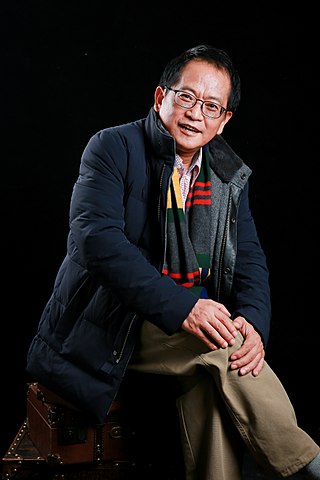
Fang Weigui is a Chinese comparative literature scholar, sinologist, and literary translator.
Walter Rudolf Schweidler is a German philosopher.
Fawzi Boubia, born in 1948 in Khemisset, is a Moroccan intellectual.
The Integrationskurs is an integration course provided by Germany to help foreigners adjust to life in Germany. The Integrationskurs is intended to prepare noncitizens to become legally and socially accepted as citizens by learning the German language and the legal system, politics, culture, society, and history of Germany.
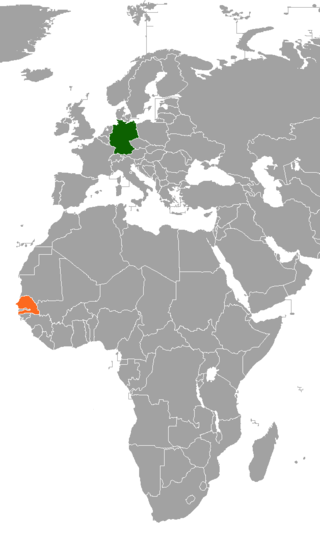
Germany–Senegal relations are the bilateral relations between Germany and Senegal. The relations are described by the German Foreign Office as "friendly." The two countries share a close partnership in development cooperation, and numerous cultural ties exist between the two countries.
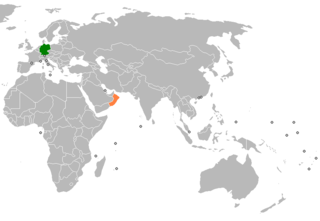
Germany–Oman relations are described by the German Foreign Office as "good and friendly". Germany is one of Oman's most important economic partners in areas outside the oil industry.

Germany–Madagascar relations are "traditionally friendly", according to the German Foreign Office. Diplomatic contacts have been maintained between the two countries since the 19th century. In the 21st century, relations between the two countries are predominantly characterized by development cooperation.














